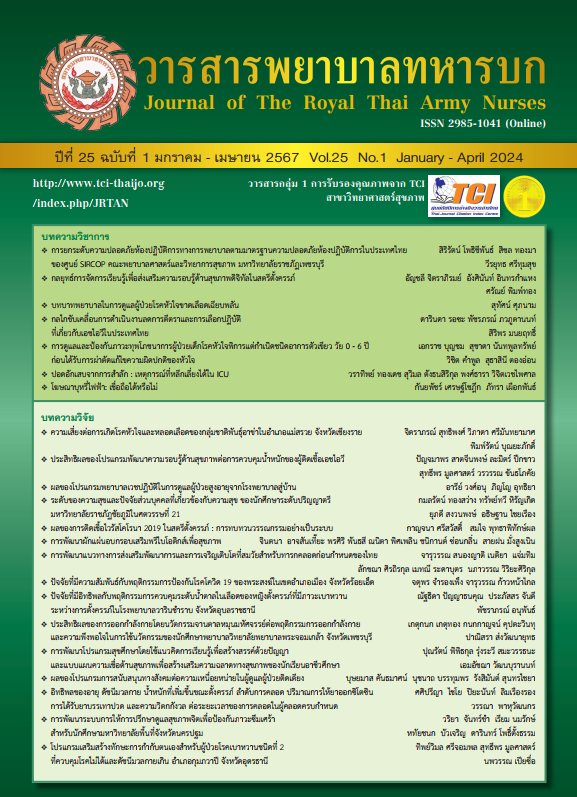The Effect of Family Support on Medication Adherence in Schizophrenic Patients with Violence Behaviors
Keywords:
Family support, Medication adherence, Schizophrenia patientsAbstract
The quasi-experimental research which was conducted as pretest-posttest control group design, aimed; 1) to compare medication adherence behaviors in schizophrenic patients with violence before and after receiving a family support program, and 2) to compare between the groups receiving the family support program and regular nursing care. The sample group was schizophrenic patients with violence who came to receive services at the inpatient department, Prasrimahabhodi Psychiatrict Hospital. They were 40 qualified patients coming along with family. They were randomly assigned to an experimental and Control group of 20 participants each. The research instruments included 1) Family Support Program, 2) Personal Data Questionnaire, 3) Brief Psychiatric Rating Scale 4) Medication
Adherence Scale, and 5) Social Support Scale; all of which have passed the content validity test from 5 experts with the alpha-Cronbrach reliability coefficient of .85 and .89, respectively. The data were subsequently analyzed using means, a standard deviation, and t-test statistics. The results: The medication adherence behavior of schizophrenic patients with violence in was .05 statistically significant and was shown to be higher than before receiving the family support program. The schizophrenic patients with violence who were in the family support program group was shown to be .05 statistically significant in medication adherence behaviors, higher than its counterpart.
Downloads
References
Lotrakul M, Sukanich P. Ramathibodi essential psychiatry. Bangkok: Department of Psychiatry, Faculty of Medicine, Ramathibodi hospital; 2015. (in Thai)
Department of Mental health Ministry of Public Health. Annual report 2021. Bangkok: 2021. (in Thai)
PrasrimahabhodiPsychiatrict hospital. Annual report 2020. Ubolratchathani; (in Thai)
Uthaiphan R,Dangdomyouth P. The Effect of Group Motivational Interviewing on Medication Compliance of Schizophrenic Patients in Community. 2013; 27(1), 136-48. (in Thai)
Buracharin W. Selected factors related toviolent behaviors of Schizophrenic patientsIncommunity [Thesis]. Bangkok: Chulalongkorn University; 2011.(in Thai)
Wehring HJ, Carpenter WT. Violence and schizophrenia. Schizophrenia Bullutin. 2011; 37(5), 877-8.
Kageyama M, Yokoyama K, Nagata S, Kita S, Nakamura Y, Kobayashi S, et al. Rate of family violence among patients with schizophrenia in Japan. Asia Pacific Journal of Public Health. 2015; 27(6): 652-60
Thongtup P. Sawangcharern K. Violent Behavior of Schizophrenic Patients and Violent Management of Family Journal of Nurses Association of Thailand, North-Eastern Division 2013; 31(4): 121-7. (in Thai)
Haddad PM, Brain C, Scott J. Non adherence with antipsychotic medication in schizophrenia: challenges and management strategies. Patient Relate Outcome Measures. 2014;5: 43-62.
Farooq S, Choudry A. Adherence to medication in the community: audit cycle of Interventionsto improve the assessment of adherence. British Journal Psychiatric Bulletin. 2017; 41(1): 41-4.
Ljungdalh P. Non-adherence to pharmacological treatment in schizophrenia and schizophrenia spectrum disorders–An updated systematic literature review. TheEuropean Journal of Psychiatry. 2017; 31(4): 172-86.
Rahmani F, Ranjbar F, Ebrahimi H, Hosseinzadeh M. The effects of group psychoeducational program on attitude toward mental illness in families of patients with schizophrenia, 2014. Journal of Caring Sciences. 2015; 4(3): 243-51.
Hassan SS, Zaki SM. Social support and its relation with medication adherence among patients with psychiatric illness. The International Organization of Scientific Research Journal of Nursing and Health Science .2018; 7(1): 64-71.
Jansook C. Jansook N. Railoy A. The Effects of Brief Intervention on Medication Adherence Behaviors of Schizophrenic Patients. Journal of The Royal Thai Army Nurses. 2019; 20(2): 170-77. (In Thai)
Rungrojwatanasiri P,Soonthornchaiya R,Upasen R.The effect of group social support program on medication adherence of elderly patients with major depressive disorder. The Journal of Psychiatrict Nursing and Mental Health. 2017; 31(1): 119-32. (In Thai)
House JS. Reading, MA (Ed.), Work stress and social support. California: Addison–Wesley; 1981.
Chiewsothorn S. The effect of empowerment in schizophrenic patients on medication adherence behaviors. Bangkok: Chulalongkorn University; 2002. (In Thai)
Overall JE, Gorham DRJPr. The brief psychotic rating scale. 1962; 10(3): 799-812.
Rungruangsiripan M, Sitthimongkol Y, Maneesriwongul W, Talley S, & Vorapongsathorn T. Mediating role of illness representation among social support, therapeutic alliance, experience of medication side effects, and medication adherence in persons with schizophrenia. Archives of Psychiatric Nursing.2011; 25(4): 269-83. (in Thai)
McCabe R, Bullenkamp J, Hansson L, Lauber C, Martinez-Leal R, Rössler W, et al. The therapeutic relationship and adherence to antipsychotic medication in schizophrenia. PLoS One. 2012; 7(4):1-5.
Thanekar S, Pawar S, Dhembare A. Impact of Psychoeducation on Expressed Emotion, Family Environment, Drug Adherence and Illness Outcome of Individual with Schizophrenia. National Journal of Professional Social Work. 2021; 22(1): 38-48.
Radeef A, Musa R, Ali S, Bakar AA. Assessment of social support, expressed emotion and Compliance to treatment among hospital admitted schizophrenic patients in Malaysia. Journal of International Dental and Medical Research. 2017; 10(1): 179-85.
Settem VJ, Karanadi H, Praharaj SK. Cognitive deficits, depressive symptoms, insight, andMedication adherence in remitted patients with schizophrenia. Indian journal of psychiatry.2019; 61(4): 335-41.
Higashi K, Medic G, Littlewood KJ, Diez T, Granström O, De Hert M. Medication adherence in schizophrenia: factors influencing adherence and consequences of non adherence, a systematic literature reviews. Therapeutic advances in psychopharmacology. 2013; 3(4): 200-18.
Downloads
Published
How to Cite
Issue
Section
License

This work is licensed under a Creative Commons Attribution-NonCommercial-NoDerivatives 4.0 International License.
บทความหรือข้อคิดเห็นใดใดที่ปรากฏในวารสารพยาบาลทหารบกเป็นวรรณกรรมของผู้เขียน ซึ่งบรรณาธิการหรือสมาคมพยาบาลทหารบก ไม่จำเป็นต้องเห็นด้วย
บทความที่ได้รับการตีพิมพ์เป็นลิขสิทธิ์ของวารสารพยาบาลทหารบก
The ideas and opinions expressed in the Journal of The Royal Thai Army Nurses are those of the authors and not necessarily those
of the editor or Royal Thai Army Nurses Association.






